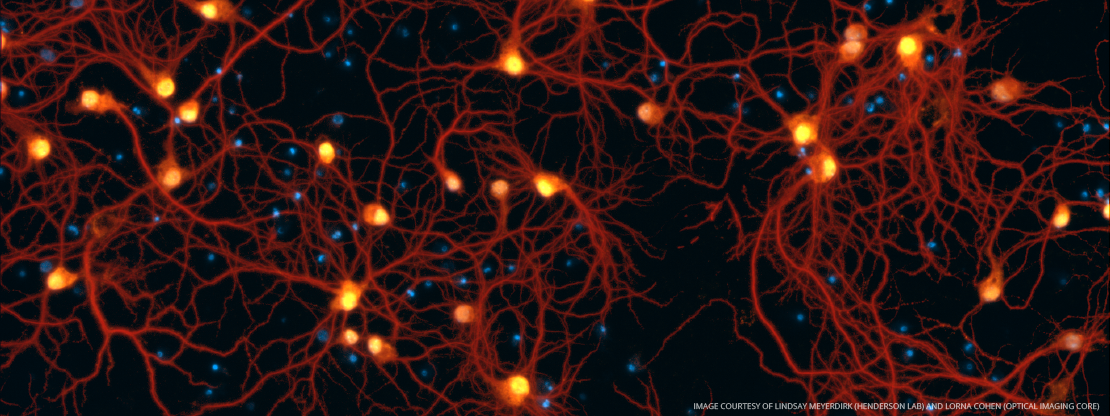Where cancer and neuroscience meet: A look ahead to the 2021 Origins of Cancer symposium
July 11, 2021

This year’s Origins of Cancer symposium explores the intersection of cancer and neuroscience — an area that holds great promise for better understanding the complex biological interactions that give rise to disease.
The topic also reflects a value that is at the heart of Van Andel Institute’s ethos: collaboration. VAI prides itself on fostering teamwork across fields and institutions in the belief that working together spurs innovation and maximizes the impact of precious resources.
As this year’s Origins of Cancer approaches, we caught up with some of VAI’s scientists to chat about the symposium, the impact of the COVID-19 pandemic on communication and the important role the event plays for trainees.
Are there any particular achievements that you think exist only because of the multidisciplinary nature of VAI?

Dr. Patrik Brundin, Deputy Chief Scientific Officer and Parkinson’s Disease Center Director:
“Van Andel Institute gains great strength from focusing on a relatively small number of research areas and being small enough for scientists in these diverse areas to interact often and actively collaborate. This has led to a creative research environment that has resulted in very innovative projects in areas such as the epigenetics of neurodegenerative and psychiatric disease.”
How have collaborations changed in the current age of global communication? What lessons do you think will be carried forward, especially after experiencing the COVID-19 pandemic?
Dr. Bart Williams, Professor, Department of Cell Biology:
“I think the most likely long-term change due to our experiences during COVID-19 is that there will be more access to meetings and talks for a wider range of scientists. If managed correctly, this may allow the scientific community to have more access to talent from places that we might have missed before (such as underserved populations at historically Black colleges and universities, small liberal arts schools, the international community, etc.). There is no reason not to develop approaches that allow students or trainees, who may not have the resources to travel to large meetings, to access talks and panel discussions. We still need to consider how to allow for networking opportunities and the types of one-on-one discussions one has at poster sessions and during informal interactions, but it’s a move in the right direction.”
What benefits do trainees get from deciding to attend Origins of Cancer?

Dr. Steven J. Triezenberg, Dean, Van Andel Institute Graduate School:
“With the Origins of Cancer symposium, trainees get to hear about the latest emerging research on really interesting questions from the leading scientists in this area. They also get time with those speakers to see a bit more what’s behind that work, and how those leaders organize their teams and collaborations to get this work done. Sometimes, these conversations can lead to future opportunities for postdoc positions or other employment. And it’s a great way to build our reputation, to let leaders at other institutions know the strengths of our Institute so that they might suggest this place for students seeking a Ph.D. degree or a postdoc position.”
The theme this year is The Emerging Frontier — Cancer Neuroscience. How do you think this multidisciplinary theme will inspire innovative new collaborations of cancer and neuroscience research at VAI?
Dr. Brundin: I think this is a great choice of topic. Cancer, epigenetics, genetics and neurodegeneration are all areas of strength at VAI. At the same time, it is clear that some researchers, for example those in cancer and neurodegeneration, rarely interact at scientific conferences. Therefore, there will be great opportunities at this year’s Origins of Cancer for novel ideas and creative collaborations.
Dr. Williams: “I think anything that forces people to think outside their own specific research focus can have unanticipated beneficial effects. Sometimes it’s just seeing things from a perspective that you’ve never considered before that can inspire a new approach to your own work.”
Dr. Triezenberg: “The notion of giving students the opportunity to organize the Origins of Cancer symposium every year came from a former faculty member, Dr. Nick Duesbery, who himself was one of the organizers of the first Origins symposia on the 150th anniversary of the publication of Darwin’s “On the Origin of Species.” This initiative got strong support from VAI’s Founding Research Director, Dr. George Vande Woude, who for many years organized what were known as the Oncogene Meetings. George was strongly committed to giving young scientists a chance to participate actively and fully in those meetings, and he fully endorsed the plan to have students plan and carry out this annual symposium at VAI. In fact, the residual funds from the foundation that supported the Oncogene meetings now endow support for the Origins symposium and other opportunities for grad students to actively engage in scientific conferences.”
Origins of Cancer: The Emerging Frontier — Cancer Neuroscience will be held virtually July 22–23, 2021. Learn more and register here.